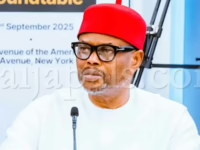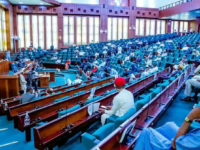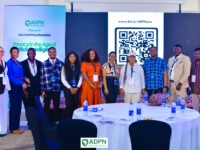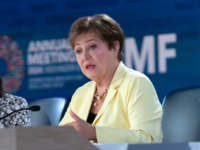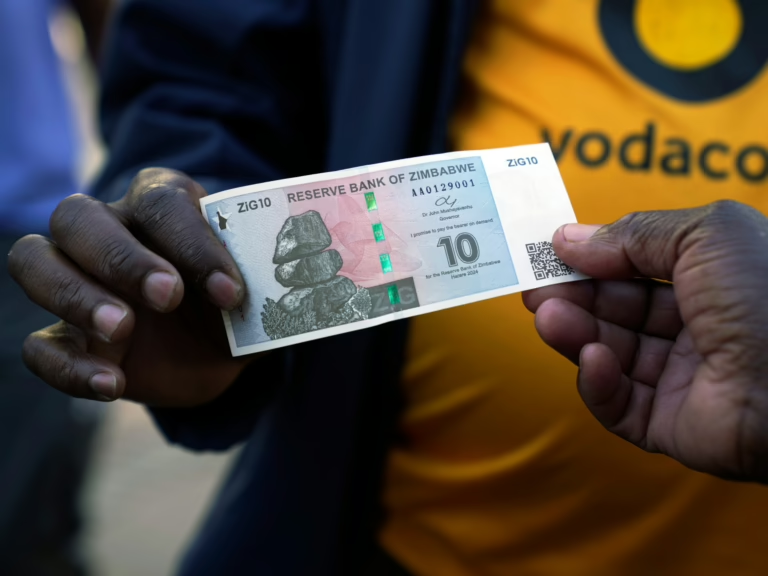Harare, Zimbabwe – Kenias Mutsenha had long abandoned his Zimbabwean local currency account, opting instead for one denominated in US dollars, a common choice among Zimbabweans seeking stability amid economic uncertainty.
However, when he accepted consultancy work in Harare this year and his client insisted on paying him in Zimbabwe Gold (ZiG), he was forced to reactivate his local currency account. At the bank, he was asked to pay a reactivation fee in ZiG notes. Since he only had US dollars, which the bank refused to exchange or accept, Mutsenha found himself in a bind.
“I had to find cash somewhere,” said Mutsenha, 46, realizing his only option was to turn to “the streets.”
While the majority of Zimbabweans prefer transacting in US dollars to avoid the volatility of the local currency, government agencies continue to operate in ZiG. Meanwhile, banks face shortages of ZiG notes because the Central Bank, aiming to promote a cashless economy, has limited the amount of physical currency in circulation, experts explain.
This scarcity has fueled a bustling black market for currency exchange in Harare’s central business district (CBD).
Since the ZiG’s introduction last year, authorities have intensified efforts to suppress informal currency trading. Yet, these crackdowns have only pushed dealers to find new, often more covert, methods-as Mutsenha experienced firsthand.
Tracking down local currency on the streets proved challenging. “I wandered through the CBD until an illegal forex dealer, who claimed to have no cash, directed me to a particular street where a disabled man in a wheelchair was exchanging money,” Mutsenha recounted.
On a busy street corner, Mutsenha met Leonard Mumba*, a 43-year-old who once sold mobile airtime at a bus terminus but now engages in a far more lucrative and clandestine trade.
Every day except Sunday, Mumba is brought into town by a relative and operates from the same spot from early morning until evening. He earns a weekly commission from the black market dealer who employs him.
As Mutsenha handed over his US dollar bill, he noticed the discreet nature of the transactions. “A man crossed the street, silently dropped a black satchel onto Mumba’s wheelchair, and left without a word,” he said.
Throughout Harare, it’s common to see dealers like Mumba stationed on sidewalks, often in wheelchairs, with satchels of cash. Quiet exchanges-such as plastic bags dropped at their feet by passing suppliers avoiding eye contact-are routine.
Greater Tolerance from Police
Following the ZiG’s rollout in 2024 and the government’s crackdown on illicit currency traders, there has been a noticeable rise in the number of people with disabilities involved in the black market, according to observers and disability advocates.
Although exact figures are unavailable, disability rights activist Plaxedes Choto estimates that over three dozen disabled individuals operate within Harare’s CBD alone.
Some enter the trade independently, while others, like Mumba, are recruited as intermediaries for others.
“I used to sell airtime at the Copacabana bus terminus, but after police intensified raids on money changers, a supplier approached me to work for him,” Mumba explained.
“Because I’m in a wheelchair, the police were less likely to suspect me, especially initially,” he added. “They tend to be more lenient with people with disabilities.”
Observers note that police often overlook or show sympathy toward disabled individuals, partly because police stations lack adequate facilities for people with disabilities, making arrests more complicated.
Harare-based human rights advocate Thabiso Moyo told Al Jazeera that this leniency allows disabled individuals to act as shields or proxies in a larger network of economic survival and corruption, with the true masterminds remaining hidden.
Moyo emphasized that using disabled traders as fronts enables the main suppliers to operate discreetly.
Despite handling valuable US dollars, disabled money changers rarely report thefts. However, many admit to paying bribes to law enforcement to continue their operations uninterrupted.
For many, including Mumba, the financial rewards outweigh previous jobs. “Selling airtime and fruits was tough. Now, with demand for cash and online transfers in both USD and ZiG, this business is profitable-I couldn’t refuse the offer,” he said.
Nearby, Clever Gorejena*, disabled after an accident a decade ago, supplements his income through similar work.
Like Mumba, Gorejena works under someone else’s direction and earns commissions based on his transactions.
“I saw this as a chance to earn money. I handle both physical currency and online deals via my phone. Besides forex, I also sell airtime-that’s my mainstay,” he shared.

Barriers to Employment and Inclusion
People with disabilities in Zimbabwe confront significant obstacles, including elevated living costs due to specialized care and resources. On Harare’s streets, many spoke to Al Jazeera about the financial strain of necessities like diapers, special diets, accessible transport, and personal assistance.
Although the government provides monthly disability grants, community representatives say these funds barely scratch the surface. Employment remains elusive. Zimbabwe’s 2021 national disability policy aimed to bridge gaps between disabled and able-bodied citizens, promoting inclusion and job opportunities. Yet, four years later, many still feel marginalized and exploited.
Consequently, many resort to begging or informal vending. A 2017 National Association of Social Workers study found that 57 percent of beggars in Harare have physical disabilities.
“Most disabled beggars have low education levels; 47 percent lack formal schooling, making employment difficult,” the report stated.
As individuals seek alternatives to begging, many enter the informal economy due to the country’s harsh economic climate, explained Samantha Sibanda, director of Signs of Hope Trust, an organization supporting disabled people. Some become involved in illegal currency trading, while others sell goods on the streets.
“The national budget and economic forecasts indicate a shift toward an informal economy,” Sibanda said. “But persons with disabilities face unique challenges, including limited access to education because few schools have accessible facilities. This reduces their chances of formal employment, and even those employed often face workplace discrimination.”
“Our infrastructure was not designed with disabled people in mind,” she added. “As a result, many disabled individuals end up in city centers, on the streets, or vending due to lack of opportunities.”

“Our Meetings Happen on the Streets”
In August, Harare City Council launched Operation Restore CBD Order, inspecting businesses to ensure compliance with regulations.
The council acknowledged awareness of disabled individuals involved in illegal currency trading but emphasized that their current focus is on unlicensed shops and unauthorized structures within the CBD.
“Any business operating in the CBD without proper City of Harare authorization is illegal, including street vendors,” said Stanley Gama, the city’s spokesperson.
Other stakeholders argue that despite government efforts to curb illicit forex trading, currency shortages and bureaucratic hurdles in banks perpetuate the black market.
Officially exchanging foreign currency for local notes is a lengthy process requiring extensive paperwork. Converting ZiG to foreign currency demands Central Bank approval, which is nearly impossible to obtain, locals say. Consequently, many resort to informal channels.
Harare resident Ngonidzashe Mutsigo highlighted additional challenges.
“I don’t have a bank account because maintaining one is costly. Withdrawing and transacting also incur fees. These factors fuel the growth of informal money changing,” he explained.
“Even those with bank accounts struggle to access US dollars officially, so we end up meeting on the streets,” he added.
A black market supplier who provides currency to disabled traders, speaking anonymously for safety, revealed that ZiG notes are increasingly scarce. Since ZiG is in high demand, these suppliers often source notes from large businesspeople.
“Businesses and government officials receiving tenders are paid in local currency-this involves millions. To get US dollars, they turn to the streets,” the supplier said.
Despite government payments in local currency, “big players” prefer US dollars.
“We assist by sourcing greenbacks and collaborate with our street operatives, including disabled individuals. We rely on numbers-the more people involved, the faster we convert local currency into the sought-after USD,” he explained.

Challenging Economic Realities
In June, the Reserve Bank of Zimbabwe (RBZ) announced a year of stability for the ZiG.
“Zimbabwe’s exchange rate has stabilized, with the gap between official and black market rates now under 20 percent. The country has also received more foreign currency, facilitating access for businesses and individuals and supporting financial sector health,” said RBZ Governor John Mushayavanhu.
However, analysts and financial experts argue that the RBZ’s assessment overlooks the persistent demand for US dollars and the wide disparity between official and parallel market rates, which fuel illegal trading.
Meanwhile, disabled individuals have increasingly become involved in this underground economy, often out of necessity.
“We are enduring difficult times,” said Sibanda of Signs of Hope. “There have long been exploiters who use disabled people for begging or to run their businesses while keeping the profits. Now, money traders recruiting disabled individuals to stay under the radar is a new form of exploitation.”
“Operating an illegal parallel forex market is unlawful, and we do not support it,” Sibanda added. “But we hope for initiatives that provide better income opportunities and improved lives for people with disabilities.”
On his street corner, Mumba shares this hope. Despite some financial relief, he acknowledges that currency trading offers no true security-economic or social. He looks forward to government programs that could help him and others leave the risky trade and unsafe streets behind.
“No one knows what tomorrow holds. Robbers could target me here or at home, affecting my family,” Mumba said. “My greatest fear is that our work is illegal and does not contribute to building my country’s economy.”
*Names changed to protect identities









